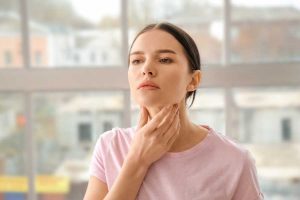A wide range of physical and mental issues in men can be attributed to low testosterone levels. As a major anabolic and sexual hormone in men, testosterone deficiency can cause premature ageing with regressing signs of virilization and male characteristics.
Symptoms of testosterone deficiency (TD) include:
- Reduced sex drive
- Reduced erectile function
- Hair loss
- Decreased beard growth
- Decreased muscle mass and strength
- Persistent fatigue and lethargy
- Nervousness and irritability, loss of interest
- Poor concentration and memory, impaired cognitive function
- Lack of motivation and drive, lack of mental firmness
- Depression
- Obesity
Testosterone deficiency compromises men’s quality of life and lifespan. There is now greater awareness of problems linked to low testosterone, and many people ask about boosting levels. As a result, testosterone replacement therapy (TRT) has become a huge commercial interest.
The Paradox in the diagnosis of testosterone deficiency syndrome (TDS)
However, a much lower proportion of men than expected benefit from TRT. In this article, I have written about the effect of aromatase activity in turning testosterone into oestrogen regardless of the amount of testosterone supplemented.
The concept of supplementing testosterone to tackle the problem of testosterone deficiency is far too simplistic considering the fact that hormones never act in isolation as they continuously and sensitively interact with the totality of one’s internal chemistry. Sex hormone levels are kept closely in check by the negative feedback control of the brain and gonads. Testosterone is one downstream component of this intricate feedback loop. I have written how testosterone replacement can actually undermine male fertility and sperm production here.
Studies show poor correlation between TD symptoms and total testosterone (TT) blood levels. Men can have TD symptoms unsupported by lab tests. There is no definitive relationship between testosterone level and TD symptoms. Each person seems to have an individual testosterone threshold for deficiency symptoms. Therefore, blood test numbers have little diagnostic value, and symptoms should be treated rather than chasing numbers.
Do you have Receptor Sensitivity?
Even with age-appropriate Testosterone levels, TD symptoms may persist due to varying degrees of testosterone resistance. This is because, like insulin resistance in diabetes, there are varying degrees of testosterone resistance in a man’s body causing a relative rather than absolute insufficiency of the hormone.
Hormones bind receptors like locks and keys to exert intracellular effects. The issue is not compromised testicular function, but insensitive cellular testosterone receptors.
If receptors are resistant, testosterone levels are irrelevant since cells do not respond properly.
How receptors become insensitive to hormone signal
It is a multifaceted problem. The ageing process, general health status and environmental effects all influence testosterone production and regulation.
Ageing
Decreased blood flow to tissues reduces testosterone supply to cells. The testes show degenerative changes like fewer Leydig cells, more fibrosis (thickening and scarring of the tissue), poorer circulation, and altered hormone synthesis. Sexual stimuli tend to be less frequent and less intense and feedback of sensory impulses from the wrinkled skin and flaccid penis creating arousal is similarly reduced. Androgens directly sensitize penile tissue for erections. Diabetes-related neurovascular changes further reduce tissue responsiveness. Improved testosterone synthesis and regulation can reverse diabetes/metabolic syndrome-related muscle loss and fat accumulation, improving erectile function.
Vegetarian/vegan Diet
Strict low-cholesterol diets have been shown to lower Total Testosterone (TT) and Free Testosterone (FT) levels by 14 per cent. Vegetarian diets, especially if low in protein, can increase SHBG, further reducing FT. Men placed on a low-fat, high-fibre vegetarian diet show an 18 per cent reduction in both TT and FT, which is reversed when they resume a normal diet. Conversely, a high-protein, low-carbohydrate diets raises TT and lowers SHBG.

Decrease of serum total and free testosterone during a low-fat high-fibre diet.
Low-fat high-fibre diet decreased serum and urine androgens in men.
Homo Sapiens’ dietary strategy should be based on millions of years of human evolution, not current ideology.
Metabolic Changes
Androgen deficiency has been shown to decrease lipid oxidation and resting energy expenditure, raising triglycerides and increasing insulin resistance. Data indicate that low serum testosterone levels are associated with an adverse metabolic profile, erectile dysfunction, and increased cardiovascular risk in men.
Insulin resistance and testosterone resistance go hand in hand
There are many parallels and interactions between adult-onset diabetes and Testosterone Deficiency Syndrome. In diabetes, if the beta cells in pancreas have been stimulated for a prolonged period of time, they become depleted and unable to secrete pulses of insulin and then become ‘blind’ to changes in glucose concentration. In the same way as beta cells fail in diabetes, in patients with testicular atrophy and androgen insensitivity syndrome, Leydig cell hyperplasia in the testis is often found.
Prediabetes, insulin resistance is an epidemic. Low testosterone, both in absolute or relative terms is an epidemic.
Insulin is the master growth hormone controlling the levels and activities of other hormones in the body including other sex hormones and stress hormones. Adding testosterone molecules when the body is in the state of insulin resistance is futile.
In the insulin resistance state, your brain, the biggest sexual organ cannot access the energy that it needs to operate effectively and your cells starve although they are swimming in the sea of glucose in the blood.
Lifestyle factors contributing to diabetes, metabolic syndrome and alcoholism cause fibrosis and damage to both pancreatic islets and Leydig cells but can be modified beneficially for both conditions.
Because of this association between insulin resistance and low testosterone, I always recommend that each patient has their hormone levels including insulin and glucose checked.





